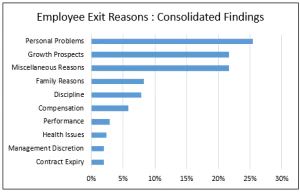It is painful when an employee exits your organization. You have spent years working together, building camaraderie, sharing goals and challenges and their quitting can be devastating in many ways. Can something be done about this? Are you tracking Employee Exit Reasons and can HR do something using this data?
Susan M Heathfield, a Human Resource Expert has written a great article Top 10 Reasons Why Employees Quit Their Job. To understand this better, we analyzed data collected over many years for about 52,000 exit records that spans 4 key verticals and is grouped by 10 distinct employee exit reasons.
We encourage you to compare these insights with exit data from your organization and identify strategies to reduce employee turnover as also retain your high performers.
Employee Exit Reasons
While compensation is thought to be the biggest reason why people quit, it is not even in the top 5.
- Personal problems: The exit reason for over 25% of all the exits. Unfortunately this reason indicates incomplete data capture by HR or line managers, typically indicating a lack of a good exit interview. HR should ensure that each employee has a formal exit interview through which the exact reason for exit can be captured.
- Growth Prospects: While this reason for employee exit may be related to a higher compensation, on further analysis, we found that the detailed reasons mentioned by employees included education (for a better role), career growth, full-time position (from contractual positions), team management responsibilities, promotion and bigger job responsibilities. With 22% exits related to this category, an organization can reduce exits of this type through open communication, career counseling, internal job placement, re-training and providing opportunities to the top performers.
- Miscellaneous Reasons: This covers about 22% exits and includes many varied reasons such as commuting issues, interpersonal conflicts, quality of work, work-life-balance and many others. HR should analyze reasons such as interpersonal conflicts and determine if these are related to the supervisor or management issues. This can prevent costly lawsuits in the longer terms and also increase retention.
- Family Reasons: This include employee exit reasons such as relocation due to marriage, maternity, unwell family members and a number of similar situations. You can prevent this type of exit by offering options of part-time work, work from home and flexi work hours.
- Discipline: Such exit cases typically are terminations related to absenteeism, ethical issues and misconduct being the key reasons. Read an interesting blog on discipline at manage discipline in your organization.
- Compensation: This employee exit reason relates to voicing an explicit dissatisfaction with the salary. It appears that in many cases Growth Prospects may relate to compensation related issues too and if the two categories are combined, we cover about 30% of exit cases. Market competitive salaries, compa-ratios, salary structuring and a extensive and frequent communication may help in arresting exit and organizations should prevent their top performers leaving because of this reason.
- Performance: We had expected a much larger number of exits in this category but in the tight job market where it is hard to find suitable replacements, effective performance management has taken a back seat. We will continue to analyze the trend here to understand how organizations are managing non-performers.
- Others: This includes health issues, expiration of contract, elimination of job role, group company transfer, voluntary exit and restructuring. These constitute a small percentage of the total exits.
Over subsequent posts I will share more analytics related to Employee Exit Reasons to help you and your organization evolve better practices for retaining that valuable employee. You can view an earlier post on Leave Analytics Employee leave trends.




